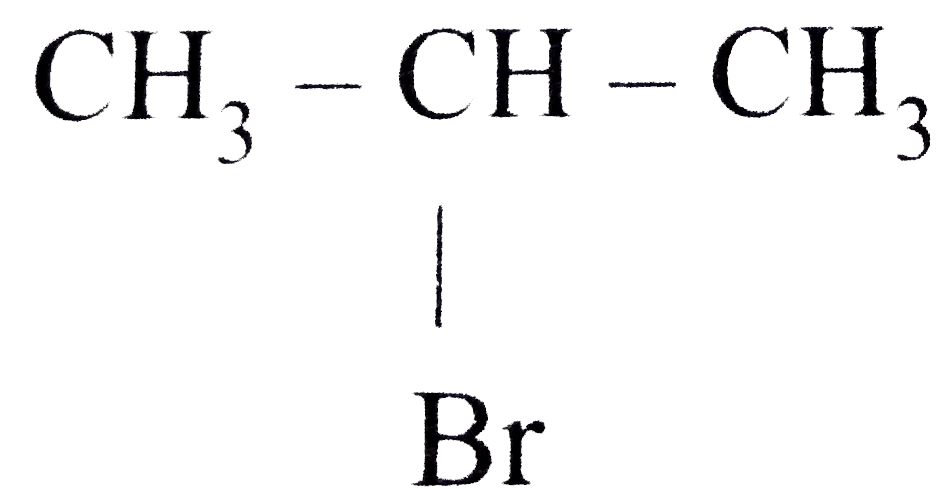Identify the set of reagents / reaction conditions 'X' and 'Y' in the following set of transformations.
CH3−CH2CH2BrX−−→ProductY−−→

X=Dilute aqueous NaOH, 20∘C ,
Y=HBr/acetic acid 20∘C
X=concentrated alcoholic NaOH, 80∘C ,
Y=HBr/acetic acid , 20∘C
X=dilute aqueous NaOH, 20∘C ,
Y=Br2/CHCl3,0∘C
X=concentrated alocoholic NaOH , 80∘C ,
Y=Br2/CHCl3,0∘C
The correct Answer is:B
CH3−CH−CH2Brconc. Alcoholic−−−−−−−−−−−−→NaOH(−HBr)CH3−CH=CH2HBr−−−−−−−−−−−−−−−→Markownikoff additionCH3−C∣BrH−CH3
Topper's Solved these Questions
- HALOGEN DERIVATIVES OF ALKANES (AND ARENES)BOOK - MARVEL PUBLICATIONCHAPTER - HALOGEN DERIVATIVES OF ALKANES (AND ARENES)EXERCISE - PREVIOUS YEARS ENTRANCE EXAMS MCQ
23 Videos
- HALOGEN DERIVATIVES OF ALKANES (AND ARENES)BOOK - MARVEL PUBLICATIONCHAPTER - HALOGEN DERIVATIVES OF ALKANES (AND ARENES)EXERCISE - TEST YOUR GRASP
15 Videos
- HALOGEN DERIVATIVES OF ALKANES (AND ARENES)BOOK - MARVEL PUBLICATIONCHAPTER - HALOGEN DERIVATIVES OF ALKANES (AND ARENES)EXERCISE - TEST YOUR GRASP
15 Videos
- GENERAL PRINCIPLES AND PROCESSES OF ISOLATION OF ELEMENTSBOOK - MARVEL PUBLICATIONCHAPTER - GENERAL PRINCIPLES AND PROCESSES OF ISOLATION OF ELEMENTSEXERCISE - Test Your Grasp
30 Videos
- ORGANIC COMPOUNDS CONTAINGING NITROGEN BOOK - MARVEL PUBLICATIONCHAPTER - ORGANIC COMPOUNDS CONTAINGING NITROGEN EXERCISE - TEST YOUR GRASP
40 Videos
Similar Questions
Knowledge Check
Identify the set of reagents/reaction conditions 'X' and 'Y' in the following set of transformation :
CH3−CH2−CH2BrX−−→ProductY−−→CH3−C∣BrH−CH3AX = dilute aqueous solution, 20∘C,
Y=HBr/acetic acid at 20∘CBX = dilute aqueous NaOH, 20∘C,
Y=HBr/acetic acid at 20∘CCX = dilute aqueous NaOH, 20∘C,
Y=Br/CHCl3, 0∘CDX = concentrated alcoholic NaOH, 80∘C,
Y=Br/CHCl3, 0∘CIdentify the set of reagent and reaction conditions 'X' and 'Y' in the following set of transformation,
CH3CH2CH2BrX−−→ Product Y−−→CH3−CH−C∣BrH−CH3AX = dilute aqueous NaOH,20∘C
Y=HBr/ acetic acid, 20∘CBX = Concentrated alcoholic NaOH,80∘C
Y=HBr/ acetic acid, 20∘CCX= dilute aqueous NaOH,20∘C
Y=Br2/CHCI3,0∘CDX= Concentrated alcoholic NaOH,80∘C,Y=Br2/CHCl−(3),0∘.Identify the set of reagents/ reaction condition ‘X’ and ‘Y’ in the following set of transformations :
CH3−CH2−CH2BrX−−→ProductY−−→CH3−C∣BrH−CH3AX=dil. Aquous NaOH, 20∘C,Y=Br2/CHCl3,0∘C41BX=conc. Alcoholic NaoH, 80∘C, Y=HBr/acetic acid, 20∘CCX = dil. Aqueous acid, NaOH, 20∘C, Y=Br2/CHCl3,0∘CDX = conc. Alcoholic NaOH, 80∘C
Y=Br2/CHCl3,0∘C
Identify the set of reagents/reactions conditions 'X' and 'Y' in the following set of transformations.
CH3−CH2−CH2BrX−−→productY−−→CH3−C∣BrH−CH3
View SolutionIdentify the set of reagents/ reaction condition ‘X’ and ‘Y’ in the following set of transformations :
CH3−CH2−CH2BrX−−→ProductY−−→CH3−C∣BrH−CH3
View SolutionIndentigy the set of reagents/reacatns conditins (X) and (Y) in the following set of transforamtion:
CH3−CH2−CH2Br(Br)−−→Product⏐↓(Y)CH3−CH−CH3∣Br
View SolutionIdentify the set of reagents X and Y in the following set of transformations :
CH3CH2CH2BrX−−→ProductY−−→CH3CHCH3|Br
View SolutionConsider the following reaction CH3−CH=CH2Br2/NaCl−−−−−−→ Product of the reaction will be
View Solution
